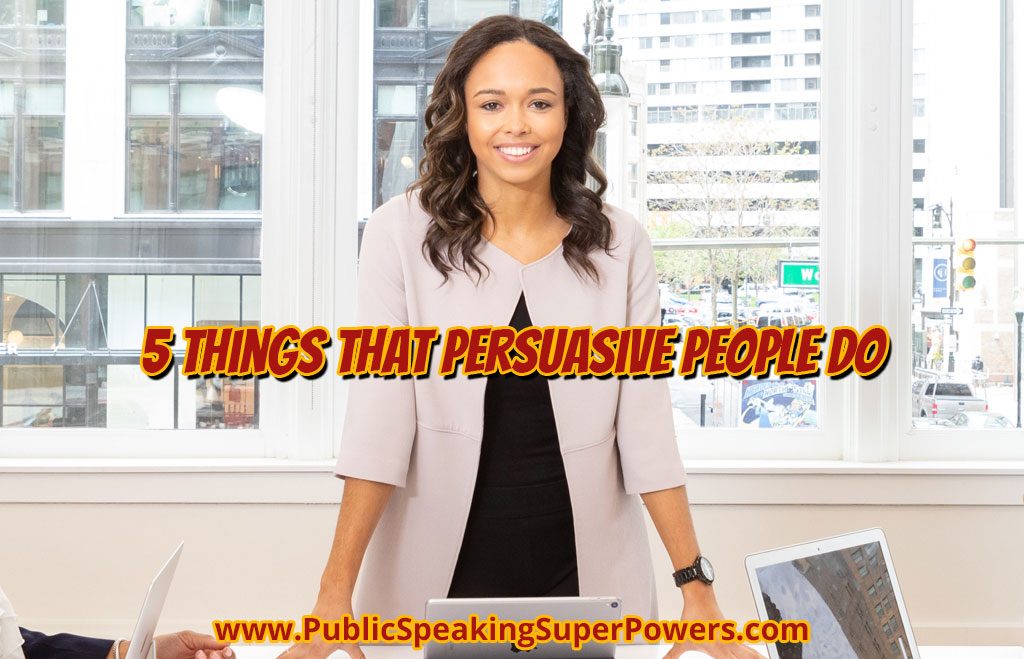Ever wonder why some people are more persuasive than others? What gives them this ability? Is it their charisma, their strong communication skills, or their self-confidence? The truth is that persuasion requires all of these skills and many others. With practice, you can become more persuasive and learn to get your message across in the most effective way possible.
This is a valuable skill for speakers, which is why I dedicated an entire chapter to persuasion in Public Speaking Super Powers. In this post, I will share the five things persuasive people do.

What is encouraging about these five things is that you can incorporate them into your life, your business, and your presentations, and thus become more persuasive yourself.
Persuasive People Listen
It’s important to know what your audience needs and wants so you can tailor your message accordingly. A good persuader will always try to determine what the other person is looking for and that requires active listening. So how do you apply this to speaking?
There are many ways that your ideal audience can communicate with you.
- What are you being asked to speak about the most?
- What kinds of questions are you asked at presentation, via email, and through social media?
- What questions are ideal audience members asking others?
The better you know your audience, the more likely you are to persuade them to take action. Therefore, do your research so that you can understand them so well they think you’ve read their minds.
Persuasive People Have a Purpose
A clear, well thought out and articulated vision can be very compelling. Persuasive people are crystal clear on their message and how to tailor it to their target audience.
Therefore, if you want to be persuasive from the stage, you need to be very clear on…
- What is your message?
- What action do you want your audience to take after your presentation?
- Where is your audience now, at the beginning of your presentation, in relation to where you want them to go at the end?
- What milestones do you need to take them to during your presentation to bring them along the journey from where they are to where you want them to be?
- What stories will resonate most with this particular audience and activate their emotions?
- What information and facts do they need to satisfy their logical mind?
With the answers to these questions in mind, you can craft a compelling and persuasive presentation for your target audience.
Persuasive People Connect
People tend to do business with those they know, like and trust. They are persuaded by those they feel a connection with. There are a few ways you can create that connection when you give a presentation.
- Take the time to talk with members of your audience before your presentation and listen to their needs. Use this information for on-the-spot tailoring of your speech.
- Give them a reason to trust you. Make sure your introduction shares your most relevant credentials and that your opening sets you up as a trustworthy expert who knows their needs.
- Be genuine and open. Your audience can spot a fake, so authenticity is very important if you want to be persuasive.
- Show that you care about their concerns. Use stories to show that you know what they are struggling with and provide actionable information that can lessen that struggle.
Persuasive People Exude Confidence
Who are you more likely to believe and trust: The person who stands tall and looks you in the eye when they are talking? Or the person who is hunched over and looks at their feed when they are talking?
I’d bet good money that you said the former, and that is because that person’s body language told you that they were confident in what they were saying. Confidence is persuasive. According to research, people prefer advice from a confident source. They are more likely to do what you want if they sense that you truly believe what you’re saying.
The funny thing about confidence is that you can project it even when you don’t feel it. Persuasive people know that and deliberately do things to project confidence. Some things you can do to project confidence are …
- Be mindful of your posture. Stand straight, shoulders back and down, head up.
- Be mindful of your intonations. End your sentences more often with a solid period — either with a neutral or downtick — rather than a question—with an uptick.
- Be mindful of your eye contact. Look at your audience—all of your audience. Don’t favor one side of the room over the other.
There is plenty of information on how to be and look more confident online and in books, but those three tips should get you started well.
Persuasive People Are Clear and Concise
Good persuaders possess strong communication skills and know-how to make themselves heard without overwhelming the audience. They are clear and concise rather than rambling on for hours.
Before you try to persuade your audience, make sure you know your subject inside out. This way, you’ll find it easier to explain it to them in a way they can understand.
These are just a few of the things that persuasive people do. They’re also consistent and patient, leave a strong first impression, and use body language wisely. They are masters at reading and responding to other people. Learn these skills yourself so you can become more persuasive, too.
Recommended Reading
Here are some books I believe can help you be more persuasive.

Yes!: 50 Scientifically Proven Ways to Be Persuasive by Noah J. Goldstein Ph.D., Steve J. Martin and Robert B. Cialdini







